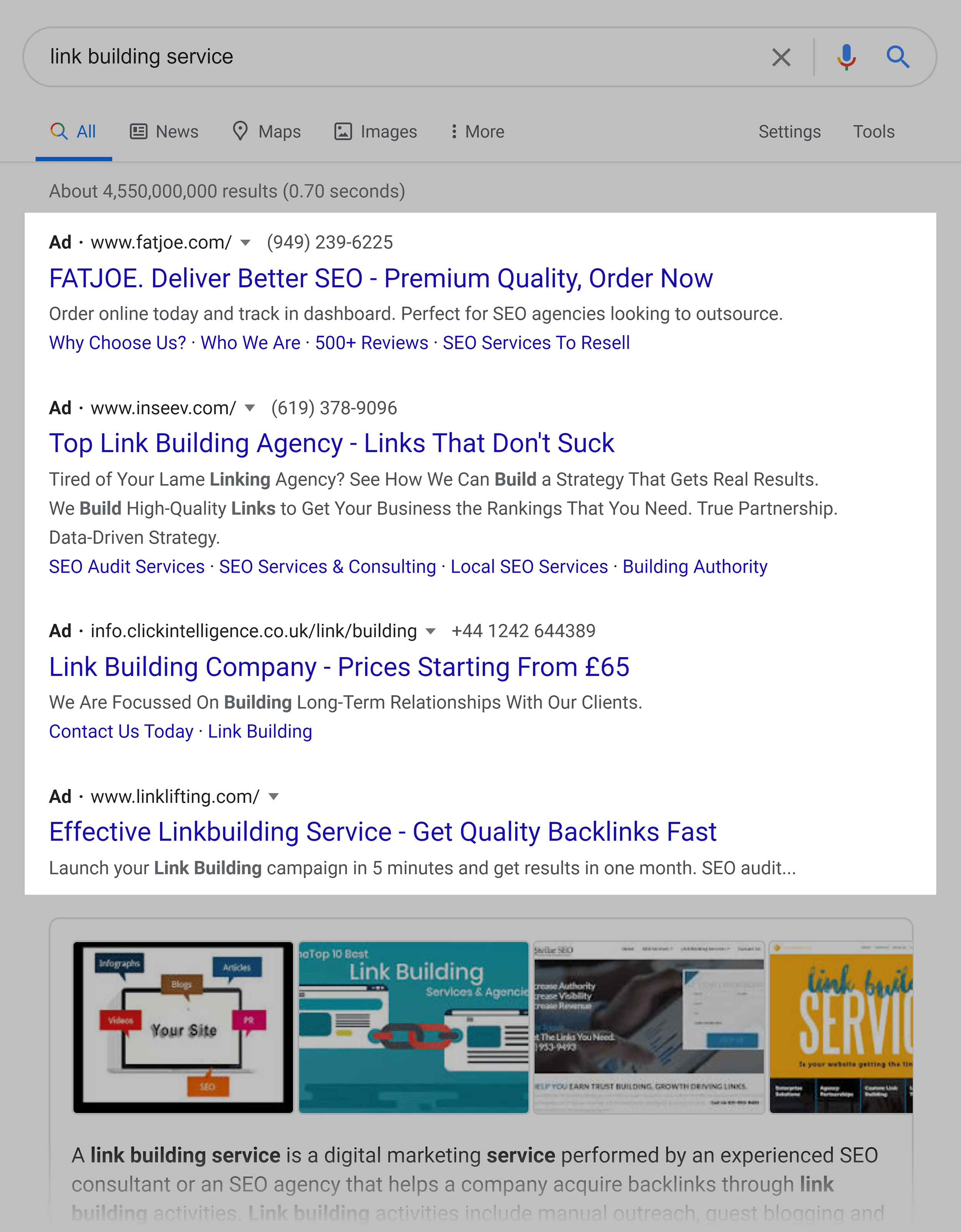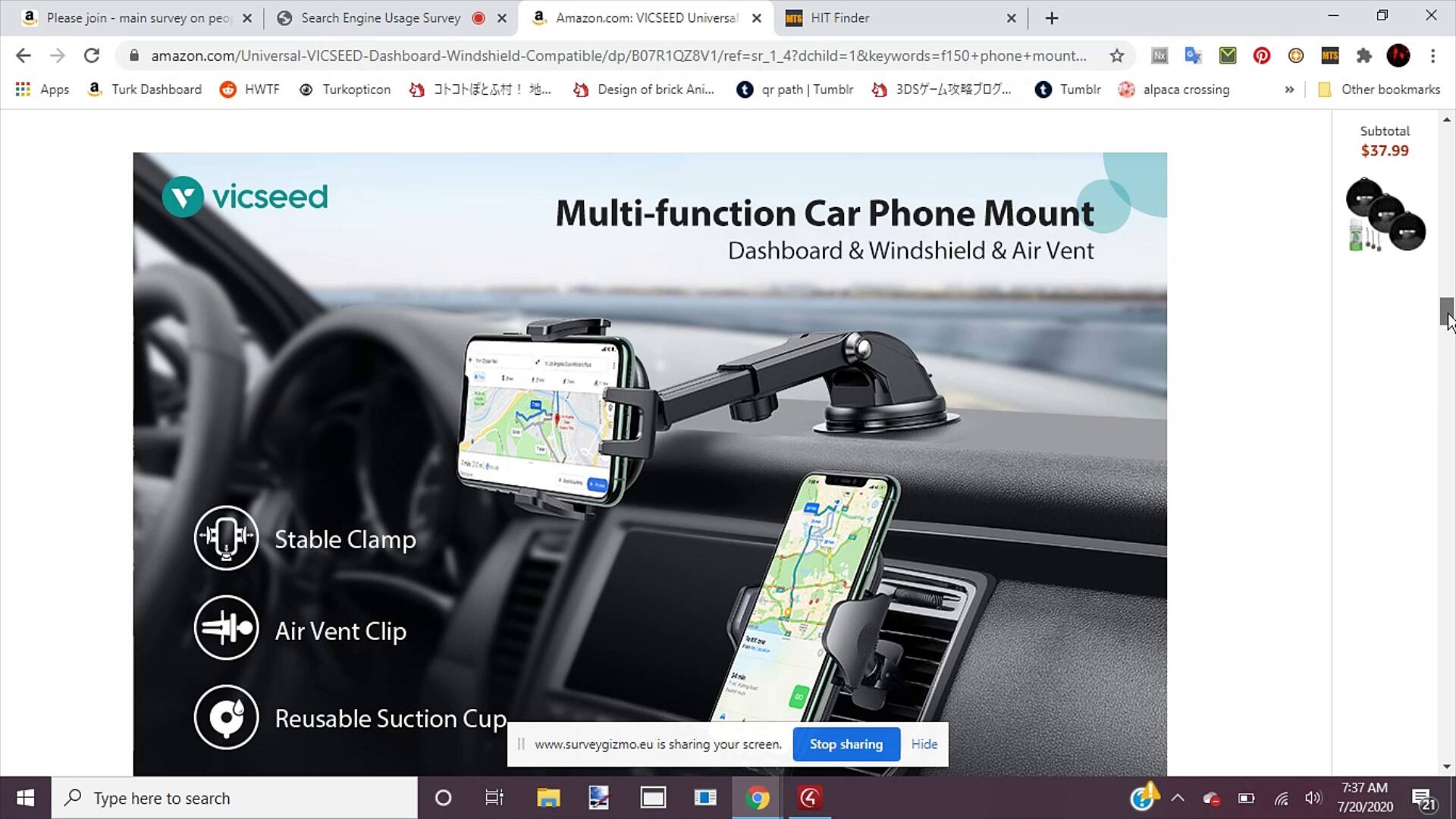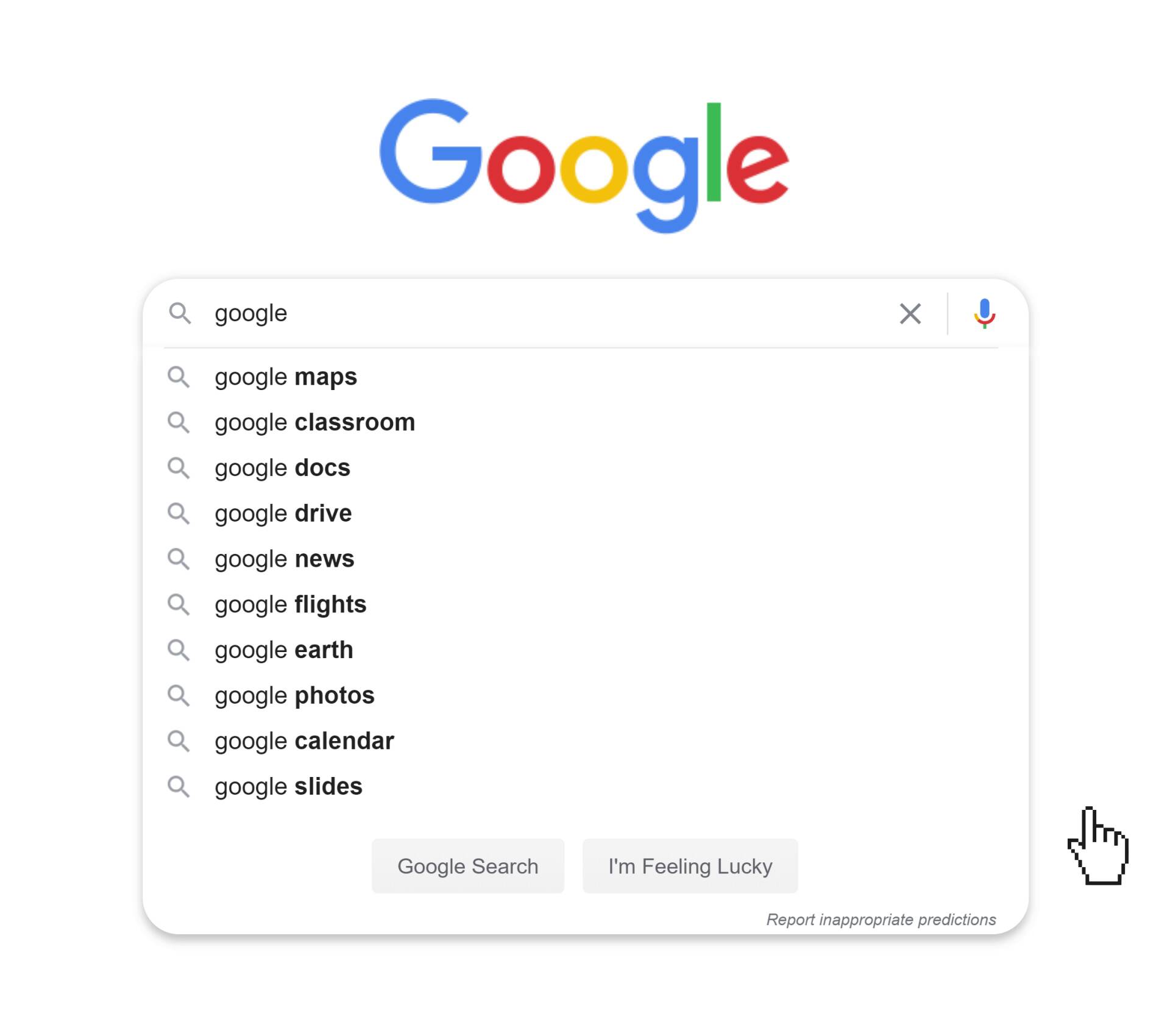How People Use Google Search (New User Behavior Study)
Written by Brian Dean
We analyzed 1,801 Google user behavior sessions to better understand how people interact with modern Google SERPs.
Specifically, we investigated:
- How many people click on ads vs organic results
- Percentage of clicks that go to local, video and Google Shopping
- Average search session length
- Number of users that make it to the bottom of the first page
- Lots more
And now it’s time to share what we discovered.
Here Are Some of Our Key Findings:
1. Google searchers use one of Google’s autocomplete suggestions 23% of the time. People that search for informational and local searches tended to click on an autocomplete suggestion more often than those searching with commercial queries.
2. 50% of Google users click on their results within 9 seconds of searching. And the average amount of time it takes a Google searcher to click on something is 14.6 seconds.
3. Only 9% of Google searchers make it to the bottom of the first page of the search results.
4. 15% of users modify their initial search terms. This suggests that Google tends to serve up highly-relevant results. Or that Google users are adept at choosing the right keyword on their first attempt.
5. Only 17% of users bounced back to the search results after clicking on a result. Only 5% of users bounce more than once for the same query.
6. The majority (59%) of Google users visit a single page during their search session. Only 6% need to visit four or more pages in order to get an answer to their query.
7. 65% of searchers click on a traditional “10 blue link” search result during their search session.
8. Although this varied widely depending on the query, 19% of searchers click on a Google Ad during their search.
9. For local queries, 42% of searchers click on results inside of the Google Maps Pack.
10. 19% of users searching for a product click on a Google Shopping result.
11. On average, only 3% of searchers interact with a “People Also Ask” box. Although this behavior varies widely depending on the query. For example, 13.6% of people searching for supplements clicked on a PAA box.
12. Only .44% of searchers go to the second page of Google’s search results.
13. The average search session takes 76 seconds to complete. And half of all search sessions are finished within 53 seconds.
Methodology: How We Did This Study
For this research we asked 454 US-based human users to perform a set of tasks using Google search.
In order to get a broad set of different queries, we asked our subjects to execute the following search tasks:
Commercial (Physical Product): Find a car phone holder for a Ford F-150 truck under $20.
Commercial (Service): Find an airline credit card that offers at least 20,000 miles to new card holders in the first year.
Commercial #2 (Service): Find a small business credit card with no annual fee and an interest rate of less than 25%.
Local: Find a car accident lawyer in your local area.
Informational: Find the best video to show you how to cut your own hair.
Informational: Find the best way to buy groceries online in your local area without any added delivery fee.
Transactional: Find supplements that may help with lower back pain.
We then recorded each subject’s screen during their session.
Here’s a sample of one of those recordings.
We then reviewed each video individually to make sure that the survey instructions were followed. In total, we ended up with 259 users (1,801 search sessions). With an overall video recording length of 2,226 minutes (38 hours).
Finally, we annotated the video data. Entered each data point into a spreadsheet. And analyzed the results.
With that, let’s break down the results.
Searchers Use Google Autocomplete Suggestions 23% of the Time
Google’s autocomplete suggests a number of keywords during your search based on search history, geography and what you’ve typed in so far.
According to our research, a fair number of Google searchers use this feature. Specifically, we found that about a quarter of all searches resulted in a user choosing one of Google’s autocomplete suggestions.

However, the number of times someone used Google autocomplete somewhat depended on the query.
Specifically, people searching for commercial and transactional keywords tended to use autocomplete suggestions most often.

Key Takeaway: It appears that Google autocomplete has a significant impact on search behavior. Especially for transactional and commercial queries.
Half of Google Users Click Within 9 Second of Their Search
Next, we wanted to investigate “time to first click”. In other words, how much time a user spent scanning the results before deciding to click on something.
We hypothesized that, while many people instinctively click on the first result, that user behavior may be changing due to the high number of SERP features that Google now uses, including video carousels, people also ask boxes, and top stories.

Not to mention that SERP layouts can vary dramatically between different searches.

This combination makes it harder for users to quickly choose the first organic result on the page. Depending on the query, the first result may be above the fold. Or well down the page. And sometimes sandwiched between Google Shopping and Google Ad results.
We discovered that 50% of people that search for something in Google click within 9 seconds. We also found that 25% of users click within 5 seconds.

On average, the “time to first click” is 14.6 seconds.

It’s also worth noting that time to first click varied somewhat depending on the query type.

Key Takeaway: Google searchers spend significant amounts of time sizing up the results before making their first click. The mean “time to first click” for a search is 14.6 seconds.
9% of Users Scroll to the Bottom of the First Page
Next, we wanted to see how many Google searchers actually scrolled down to the bottom of the first page results.
We discovered that only 9% of people ended up at the very bottom of the results.

However, this user behavior was dependent on the type of query. People searching for our transactional “find supplements for back pain” query saw significantly more of the SERPs compared to those searching for the commercial “find a car phone holder”.

This is likely due to differences in SERP features.
Commercial keywords tend to bring up Google Shopping results. Which almost always appear above the fold.
On the other hand, transactional and informational terms typically present a more traditional “10 blue links” layout. Which can lead to more scrolling and clicking further down the page.
Key Takeaway: Relatively few (9%) of Google users make it to the bottom of the SERPs. Many either find an answer to their query towards the top of the page. Or, if they don’t find what they need above the fold, prefer to modify their query instead.
Only 15% of Google Users Modify Their Initial Search Term
We discovered that 85% of Google users find an answer to their query with their initial search term.

This may be due to the fact that Google (through updates like Hummingbird and RankBrain) has improved their ability to understand the true intent of a query.
Or that Google’s search results are simply better than in the past. Which leads to someone finding a relevant result towards the top of the page.
It could also be that Google users better understand how to search. In other words, they’ve been trained over thousands of searches to phrase their queries the right way.
Either way, Google searchers generally find what they need with their first query. Which is why very few ultimately change their query after their initial search.
Key Takeaway: Only 15% of searchers ultimately modify the keyword that they initially searched with.
17% Google Searchers Bounce Back to the SERPs
Although controversial, there is evidence that Google’s algorithm looks at “behavioral signals” to figure out whether uses are satisfied with the results.
Regardless, we wanted to see how many people bounced (or more precisely “pogo sticked”) after clicking on a Google result.
And we found that 83% of users didn’t bounce from the result they chose to click on. And that only 5% of users bounced multiple times during a single search session.

Although, again, this varied depending on the query.

Our research also found that the majority (59%) of searchers clicked on a single result. And that a small percentage of users (6%) visited 4+ pages in order to find an answer to their query.

Again, this shows that Google generally does a good job of satisfying a user’s query.
Combined with the fact that, as discussed above, Google searchers spend a fair amount of time deciding on the most relevant result to click on.
Key Takeaway: 17% of people that click on a Google result bounce back to the SERPs in order to choose a different result.
65% of Google Searchers Click on The Organic Results
Google has rolled out a number of SERP features over the last few years, including Featured Snippets, Knowledge Panels, Twitter cards and more.
Despite that, we found that 65% of searchers clicked on at least one “10 blue link” organic result during their search session.

That’s not to say that these users didn’t also click on an ad. We found that many users do click on both organic results and ads during their search session.
However, it is noteworthy that the vast majority of searchers end up clicking on the organic results at least once during their session. And a fair number (10%) click on multiple organic listings.
Key Takeaway: 65% of Google users click on an organic result during their search session.
19% of Users Click on a Google Ad During Their Search
Google Ad listings take up more SERP real estate than ever before.
Today’s Google Ad placements are also more prominent and now largely resemble organic results.

We found that 19% of Google users click on a Google ad. And that only 4% click on multiple ads during the same search session.

This number may be a bit higher than expected due to the fact that many of the queries in this study were commercial or transactional in nature.
In fact, we found that this behavior was highly dependent on the type of search someone was conducting.
Specifically, commercial and transactional searches led to significantly more Google Ad clicks compared to informational queries.

This is likely due to the fact that those searches generate more ad placements. And that the search intent is more geared towards product and service pages. Which may lead users to find ads highly relevant for their search.
Key Takeaway: 19% of Google users click on a Google Ad. However, this number varies widely depending on the type of search that someone is performing.
42% of Local Searchers Click on the Google Map Pack
For local queries (“sushi New York”) and even queries that Google can consider local depending on context, they present users with a “Map Pack”.

A map pack is a set of three results pulled from Google Maps that’s mixed in with the “normal” organic results.
We found that 42% of people searching for local terms ultimately click on a result in the Google Map Pack.

Considering its prominence in most local SERPs, it’s no surprise that a large number of users choose to find a local business using the Map Pack.
Key Takeaway: 42% of people searching for a local business click on a Google Map Pack result.
19% of Product Searches Result in a Google Shopping Click
Google Shopping results appear above the fold for many product-specific search queries.

So it should come as no surprise to find that 19% of people that search for a product end up clicking on a Google Shopping result.

Key Takeaway: 19% of people searching for a product click on the Google Shopping results at least once during their search session.
Only 3% of Google Users Interact With a People Also Ask Box
According to data from SEMrush, 43.21% of all Google search results have a People Also Ask Box.

Which makes them one of the most prominent features across all SERPs.
We wanted to know how many users actually interacted with PAA boxes.
And we found that very few (only 3%) of searches in Google result in a click on a People Also Ask box.

However, we did find that certain transactional and navigational searches result in much higher PAA box interaction (13.6%).

Key Takeaway: While People Also Ask boxes appear in a high number of SERPs, they’re not interacted with that often for most queries. In fact, only 3% of searches in our sample resulted in someone interacting with a PAA box.
0.44% of Users Visit Google’s Second Page Results
Not surprisingly, we discovered that very few users (.44%) make their way to Google’s second page.

This is in-line with organic CTR research that we conducted last year using data from Google Search Console.
In that study we found that .78% of users visited the second page of the results.
Key Takeaway: Only 0.44% of Google users visit the second page to find an answer to their query.
The Average Google Search Session Lasts 76 Seconds
When someone searches for something in Google, how long does it take them to find what they’re looking for?
According to our data, the average person ends their search session after 76 seconds.

We also found that 25% of search sessions were super fast (<31 seconds).
Like many of our findings, the timeframe here varied depending on the type of search our subject was conducing.

Again, this shows that Google does a relatively good job of packing the first page with relevant, useful results. And providing SERP features that help direct people to relevant content faster.
Key Takeaway: Although somewhat dependent on the query, our data shows that most Google searches are completed successfully in a relatively short time frame (76 seconds on average).
Conclusion
I hope you enjoyed this research.
The Google SERPs are rapidly changing. More ads. More SERP features. And even entirely new search experiences, like Google Discover.
Which is why we wanted to get a glimpse into how users interact with modern day search results.
If you’re interested, here are our methods and full set of results. And a link to a GitHub repository with the raw data.
Backlinko is owned by Semrush. We’re still obsessed with bringing you world-class SEO insights, backed by hands-on experience. Unless otherwise noted, this content was written by either an employee or paid contractor of Semrush Inc.

